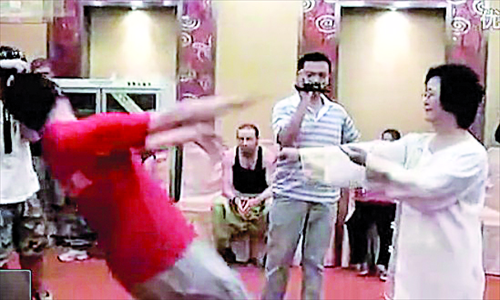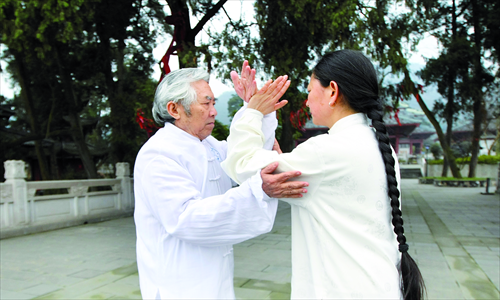Wushu madness

Once upon a time, if you wanted to watch grown men being blown away by a single touch, you had to pay to go to a cinema to see a Kung Fu movie.
Recently however, a clip demonstrating this kind of "magical" power has been circulating online, featuring a 58-year-old woman named Yan Fang, from Shijiazhuang, Hebei Province.
The video, which purportedly demonstrates the skills of a Tai Chi master, but resembles a comedy skit more than anything else, became a heated topic among Web users in the past week. An overwhelming majority of those who commented ridiculed the clip, saying that Yan was more of a performer than a Wushu trainer.
Tai Chi 'magic'
The clip shows Yan, the self-proclaimed "Jingwu Tai Chi first heir," as she accepted new Tai Chi students in June. She began by showing them the "Pushing Hands" traditional Tai Chi techniques.
One by one, roaring well-built men attempt to challenge her, but fall to the ground the moment they lay a finger on her, seemingly struck down by Yan's inner power.
When the Tai Chi master gently pats the shoulder of a reporter, one of her pupils shouts and falls to the ground, despite being around a meter away from the reporter.
The reporter, however, did not feel it. Yan claimed that her abilities only work for people who have been practising Tai Chi for years.
This move echoes the far-fetched tales that can be found in Wushu (Chinese martial arts)fantasy novels.
Web users were quick to dismiss her as a fraudster, adding that her foolish tactics would damage the image of Wushu.
"You can easily tell that the Pushing Hands techniques Yan performed were not real," Liang Weijie, a national level-2 Tai Chi coach in Guangdong Province, told the Global Times.
"Chinese Wushu has a long history but it is still closely connected to basic physics. How could a man fly away from just a single gentle touch?" he asked.
Yan told the Xinhua News Agency that she believed these Web users were criticizing her because "they have no idea of Tai Chi or Wushu, and if you have reached a certain level in Tai Chi, it is hard to describe the level with words."
Yan teaches Tai Chi in her spare time and claims to be the CEO of three companies in Shijiazhuang. However, none of the three companies could be reached for verification on Wednesday.
Liu Hailong, a pupil who has been learning from Yan for three years, told Xinhua that he could feel a strong pushing pressure when pushing hands with his master and he had to jump back a few meters to reduce the pressure.
He added that this involuntarily caused shouts.
The basic theory of Pushing Hands is to cause the attacker lose their center of gravity and make them fall, said Jiang Yong, chief of the Tai Chi Research Committee in Sichuan Province.
He told the Global Times that it was possible for a Pushing Hands master to stand firmly while being pushed by several men, but the video seriously exaggerated that power.
Master or charlatan?
While the public questioned Yan's background, labeling her a fraudster and calling her qualifications into question, Tai Chi specialists were calling for these dramatic promotion methods to be banned.
What Yan did not only cheated Chinese, but may also con people from abroad who know little about Tai Chi, said Liang.
"If some foreigners who were fascinated by her skills came to China without understanding how Tai Chi works, Tai Chi and China itself would be disgraced," he said, adding that he had been training with his master for three to four years before becoming a practitioner of the traditional activity.
Jiang said the major practitioners of Tai Chi are adults and senior citizens aiming to exercise through traditional Wushu, but if people try to make it mysterious and mystical, it will tragically prompt people to resent it.
Jiang added that it couldn't be ruled out that many people are committing fraud to enhance their reputation and earn money, and the easiest way for a Wushu master to prove otherwise was to compete.
"Public awareness is improving compared with 10 to 20 years ago, as at that time, this kind of video would bring in a large number of followers and a lot of profit," Xu Weijun, a professor of martial arts at Beijing Sport University, told the Global Times.
In the 1980s, Tian Ruisheng from Luoyang, Henan Province boasted the creation of "Chinese Scent Kung Fu", or Xiang Gong, and said that practitioners could be immortal, attracting a large group of followers.
When he died in September 1995, his son hid the truth of his death and his family continued to cheat money from followers until they were arrested in 2005.
"Despite so many frauds of this kind being exposed, there are still quite a few people who choose to believe because Wushu has already become a cultural symbol in China," said Xu.
Xu said that since Chinese society doesn't advocate violence, Wushu has been practiced among the public without an authorized status or national unified standards, so practitioners have had to find other ways to make a living.
The Wushu Administrative Center of the General Administration of Sports, which is in charge of organizing Wushu contests and training, was unavailable for comment on Wednesday.
Xu called for related departments to monitor Wushu practitioners and take the responsibility of spreading the scientific concepts.
